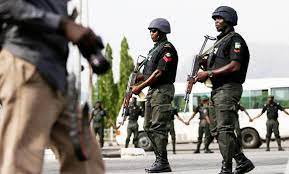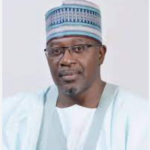The recent arrest of Garba Shehu, the media consultant of the Atiku Abubakar Presidential Campaign Organisation, brought into stop focus Mice again the problem associated with-issues of national security in the setting of a democratising society. The problem is particularly in need of interrogation when a combination of circumstances is present; these include a recent history of misuse of the concept of ‘national security’ by military dictatorship, as Nigeria’s recent past witnessed an incomplete or very problematic transition, as is the case with our country. Let me set out by saying that 1 was particularly intngued by the statements that Garba Shehu made about his experience with operatives of the State Security Services (SSS) on his release. He said that those were professional men doing a very difficult job, and that they had acted without any ethnic, religious or other forms of discrimination.
Garba Shehu then hoped almost tongue-in-cheek, that other Nigerians could have the same ‘civil’ reception if they had contacts, confrontations or other experiences with the security agencies of the Nigerian state. If one reads the words of Garba Shehu between the lines, one would get the impression that even the operatives of Nigerian security were operating within a very difficult circumstance, one which they would have loved to have the conceptual, policy and operational space within which they can independently analyse and weigh the issues involved in national security. But the feeling that I have from the perspective of a patriotic observer of the security space is that, that ‘relative autono-my’ which is very vital for die security services to operate within, is constantly being violated by more overzealous elements of the security apparatchik who work in cahoots with the political regime of the day. They make all efforts to use the security apparatus to fight their political battles against their enemies.
practices, these individuals can only midwife a monster, a mongrel that is a
There are several examples of this misuse of the security system as weapons of political struggle in the past seven years of the Obasanjo administration. These range from the breaking up of manifestations of opposition groups while tacitly supporting those in support of the regime, the harassment of individuals opposed to the Obasanjo clique and the most unacceptable breaking up of a meeting by leading politicians to included an ex-Head of State, General Buhari and members of the National Assembly at the height of the third term maneuverings by President Obasanjo. These different instances, amongst several others, brought the security services a fair amount of odium from the Nigerian people, largely because they seemed to have become a recurrent pattern often behaviour, which people ajss^tp/t with the worst days of military dictatorship.
It was not a coincidence that as the Obasanjo regime was becoming ever more intolerant, authoritarian and undemocratic in its practices, the security situation seemed to increasingly reflect the worst aspects of the methods people naively believed had been overcome with the end of military dictatorship. But the security services were apparently aware of the popularly held belief that they were arresting someone like Garba Shehu, for example, because ofthe role he is playing in exposing the Obasanjo side of the sleaze that had eaten deep into the entrails of the Nigerian presidency despite the posturing, the huffing and pufBng of the despot at Aso Villa That was why the SSS came out with the statement that “the service acted independently in the discharge of statutory responsibilities” with the arrest of Garba Sheha Nobody was convinced with the statement that they were investigating the media consu!tant“of certain acts and plans capable ofthreaterungthe internal security of Nigeria”.
The scepticism of Nigerians came because of the coincidence associated with the timing of the actions of our national security services. Why were the “acts and plans capable of threatening the internal security of Nigena” discovered only when Garba Shehu was providing damning evidence of sleaze against Obasanjo? It was almost within the same political atmosphere of revelations against President Obasanjo and the (Tokunbo?) presidential aircraft that two journalists were not only arrested and detained, but were arraigned in court for sedition (a law that learned people say has been expunged from the statute books of Nigeria!). There are several issues to property interrogate, as I said at the beginning of this piece. First of all is the nature of Nigeria’s democratic transition; the seven vindictiveness and cruelty. It is a situation where there is no wall that divides the whims of our dictator from the actions of state institutions. It is with Obasanjo that the country has crane closest to the maxim: I ’etat c ’est moi\ Within this deformed political environment, the security services, despite the very best intentions of its patriotic operatives, can oily walk the tightrope of difficulties coming from the distortion of their roles under military dictatorship and the deformed democratisation under Obasanjo.
This for me is at the heart of the crisis which has been facing the security apparatus since 1999. There has not been a thorough effort to work out the dialectic of what the strands of state security are and how to situate them within the robustly argumentative ambience of democracy and the needs of regime security by the government of the day. The truth is that they are not the same even when they might have overlaps and interconnections. Our security services in my view are not properly finding the balance and they seem to be leaning more and more in the direction of substituting the needs of regime survival for national security needs. It must be underlined that at the heart of the democratic process include free discussion, the right to dissent, and the absence of sacred cows and individuals who cannot be brought under the sharp scrutiny of free citizens within the ambits of the laws of the land.
Nigeria’s democra-tisation lives in the uncomfortable interface between efforts to institute a robust political culture and pre-modem survivals of gerontocracy and neo-feudalistic deference; this manifests in the “Baba syndrome” that is the ruling orthodoxy under the despot, Olusegun Obasanjo. We have the absurd situation where a so-called democratically-elected president receives plaudits fit only for feudal chiefs (an irony, given the wretched and lowly origins of the despot). This neo-feudal environment that envelopes a supposedly democratic or democratising social casts an authoritarian shadow on all institutions if our society, including the security apparatus. It seems unthinkable for people who work within this antidemocratic ambience to fathom that “Baba” can be a criticised, not to talk of being exposed as not being better than a petty thief, as the revelations of the past few weeks have shown despite the delusions that Obasanjo carries around as an anti-corruption crusader. This is why the heated atmosphere of politics is immediately vacated and the law and order toga of a
There are several issues to properly interrogate, as I said at the beginning of this piece. First of all is the nature of Nigeria’s democratic transition; the seven years of Obasanjo have exposed the flawed nature of Nigeria’s democratisation With hindsight, most Nigerians now realize that while the most radical and progressive segments of society: the human rights activists and the working people were at the forefront of the struggle to defeat military dictatorship, the post-dictatorship inheritors of power were active collaborators with military dictatorship. The leading limits of the civilian government, such as Jerry Gana, Tony Anenih, Ojo Maduekwe, and a host of others, had spent a previous incarnation as foot soldiers of military dictatorship. So by their philosophic mindsets, by their policy choices, and their political practices, these individuals can only midwife a monster, a mongrel that is a cross between a military dictatorship and an authoritarian civilian regime. The monster that they brought to life also carries the gene of Obasanjo’s intolerance, vindictiveness, and cruelty.
years of Obasanjo———- With hindsight, most Nigerians now realise that while the most radical and progressive segments of society: the human rights activists and the working people were at the forefront of the struggle to defeat military dictatorship, the post-dictatorship inheritors of power were active collaborators with military dictatorship. The leading limits ofthe civilian government, such as Jerry Gana, Tony Anenih, Ojo Maduekwe and a host of others, had spent a previous incarnation as foot soldiers o f military dictatorship. So by their philosophic mindsets, by their policy choices and their political
National security state is substituted. Individuals and groups on the opposing side of the heated political debate are immediately pounced upon, arrested and detained.
These are manifestations of an incomplest democratisation of the state, including the security apparatus. fundamental level is At the fundamental level is the fact that the Nigerian state has its roots in the colonial state instituted by British imperialism to conquer the Nigerian people in order to serve the demands of British capitalism in the nineteenth and early twentieth centuries for raw materials to feed the industries of Britain and for markets for British industrial goods. The British created a colonial apparatus of army, police and security, which subdued the Nigerian space, he/ping to consolidate its incorporation into the world capitalist division of labour. At independence, the nationalist elite began a process of ‘Nigerianisation’ of the colonial of neo-colonialism. So while the personnel that run the post-colonial state had become Nigerian the philosophical paradigm did not shift; it was still anti-people in content, and these institutions have not been purged over the years. Unfortunately, Nigeria has also lived through a very long period of military dictatorship, which by the end of the Sani Abacha years, saw the worst excesses of a post-colonial, national security state. This period saw our national security apparatus throw up really despicable individuals who let loose the instruments of security against the democratic aspirations of the Nigerian people. The consequences of the nineteen eighties and nineties are still very much with us and the security apparatus of the Nigerian state, because our democratisation is deformed it is incomplete and the openness that characterise a genuinely democratising society have not been adequately internalised by the security apparatus.
Of course, there are no easy options for the security apparatus anymore than there are for all of us who desire the incremental deepeening of our country’s democratic process. It has therefore become imperative for the security apparatus to interrogate the dialectical relationship between the needs of national security, which must be properly articulated within the ambits of a democratic culture, and the needs of regime survival, which the Obasanjo administration-has attempted by subterfuge to equate with the needs of national security. The truth is that regimes come and go, no matter their content and the illusions of self-importance; but state security will always be a contested terrain, because we live in a class society where the hegemon! class,defines its class interest as the needs state security. But the fact that acts of class resistance and even intrti-c/nss disputation can never be eliminated, as we are witnessing with the current face-off between the president and his vice, all make state security such a problematic terrain of activity.


